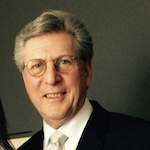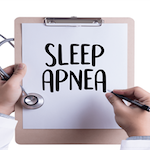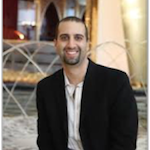July 2018
Spotlight of the Month

Barry Chase, DDS
Chase Dental SleepCare, Melville, New York
Founded in 2009 by Dr. Barry Chase at a single location in Melville, Long Island, NY, Chase Dental SleepCare (CDSC) is a private practice dedicated to only dental sleep medicine, treating patients with sleep breathing disorders (Obstructive Sleep Apnea, Snoring, and Upper Airway Resistance Syndromes) and related Craniofacial Pain and Temporomandibular Joint Dysfunctions (Sleep Bruxism). Today, Chase Dental SleepCare has since expanded to 13 locations throughout the NY Metropolitan area to include, Nassau and Suffolk counties on LI, Queens, Brooklyn, Yonkers and Manhattan. CDSC is a physician based referral practice participating with Medicare and most private medical insurance plans.
Favorite Success Stories:
- • A young man in his 20’s, married, snoring, sleeping in the guest room, obese and unable to get to work on time as he woke in the morning still extremely sleepy, sleeping up to 10 hours on the weekend was treated with oral appliance therapy for his severe obstructive sleep apnea. When he came in 3 months later, he said not only was he sleeping in the same room with his wife, and able to cuddle, but he got such good quality of sleep that he was only sleeping 7 hours and waking at 5 am. With nothing to do at that early hour, he realized that the only place open at 5 am was the local gym, which he joined. 3 months later he lost 30 pounds, bought new contemporary clothes and looked amazing. He said, “Dr. Chase, you have changed my life. I will forever be so grateful”.
- • An older woman in her 70’s, living in Manhattan, thin, attractive, finally retired. She looked forward to the museum tours, Broadway shows, the book clubs, and the small intimate jazz clubs in NYC. Her problem however, was not only did she fall asleep from her mild obstructive sleep apnea during the events she so looked forward to, but she snored loudly. After being treated with oral appliance therapy, she said, “Dr. Chase, you gave me the retirement I always imagined having one day. I will forever be so grateful”.
- • Old or young, thin or obese, man or woman, mild or severe OSA, regardless, a custom constructed oral appliance for OSA is a life changer.
Tips for Treating Patients:
With many locations, treating over 2000 new patients a year, a well trained staff is paramount. Creating an infrastructure of highly trained administrators directed by a Chief Operating Officer, driven by standard operating and communication systems, and a customized dental sleep medicine software is the backbone of our organization. Additionally, our clinical teams are educated in sleep and dental sleep medicine to provide our patients with unsurpassed treatment outcomes and exceptional clinical experiences.
- • Make dental sleep medicine an office experience, not a dentist experience. Train and involve the entire office staff, administrators and clinical. It is rewarding and inspiring for all.
- • First, get new patients from the proverbial low hanging fruit – screen your own patients. After gaining some experience, meet the physicians in your area. Remember, you are the solution for them when they have CPAP non-compliant, non-tolerant patients. And make referrals to the physician. If you want referrals, you need to make referrals.
- • Follow medical protocol exactly as it is demanded for sleep medicine, even if you are not filing for medical insurance reimbursements. Never treat a patient without a sleep study and a proper diagnosis, and refer back to the testing physician for follow up care. Learn the rules and follow them.
- • Oral appliance therapy for sleep breathing disorders is medicine, not dentistry. In dentistry we fix/treat teeth. In dental sleep medicine we are providing therapy/managing (not fixing or treating) for a medical malady, with a medical diagnosis, with a medical device. This mandates looking at the whole patient, not just the oral cavity – their medical comorbidities, medications taken, sleep hygiene, desire to be compliant, and expectations for the appliance.
You’ve done the hard part: dental school, State Boards, practicing dentistry. Your ability for attention to detail and working in small wet spaces on often fearful patients should never be underestimated as an outstanding and highly talented accomplishment. If you can practice dentistry, you can practice dental sleep medicine. Anything new is intimidating at first. But stick with it. In a matter of a few months, and just a couple of courses or seminars, the fog lifts and it all makes sense. You too will change, and perhaps, save lives with oral appliance therapy.
The statistics are that only about 10% of those who have a sleep breathing disorder are being diagnosed and of those being treated, only 5% are getting oral appliance therapy. Dental sleep medicine needs you.
Dr. Barry Chase, DDS
Fresh Finds
Featured Course
Treatment Options for OSA
With Dr. Jonathan Greenburg & Vickie Smoker

Treat your severe patients with confidence! This course will focus on treating severe sleep apnea patients including lessons on when to use combination therapy, APAP’s in the office, and the steps of delivering a Zyppah K appliance. There is also discussion on what the Medicare-approved appliances are and the process of using a Zyppah Pro appliance.
Featured Webinar
Is Sleep Apnea and Snoring the Cause of your Patient’s Weight Gain & Fatigue?
Presented by Jay Khorsandi, DDS

Dr. Theodore Friedman hosts Jay Khorsandi, DDS from Snore Experts for an informative webinar on the relationship of patients with Sleep Apnea and Snoring, to their Weight Gain and Daytime Fatigue.
Topics to be discussed include:
• Does poor sleep lead to weight gain and fatigue?
• Home sleep testing vs. in lab testing.
• Options for Sleep Apnea and Snoring treatment.
• Treatment success for weight loss and more energy.
• Dr. Friedman will also share comments about the endocrine effects of poor sleep.
Bring your questions!
Wednesday, July 11th
at 5 PM PST/ 8 PM EST.
Pediatric Sleep Disordered Breathing/ Obstructive Sleep Apnea
Potential consequences of untreated pediatric sleep disordered breathing:
• Social: Loud snoring can become a significant social problem if a child shares a room with siblings or at sleepovers and summer camp.
• Behavior and learning: Children with SDB may become moody, inattentive, and disruptive both at home and at school. Sleep disordered breathing can also be a contributing factor to attention deficit disorders in some children.
• Enuresis: SDB can cause increased nighttime urine production, which may lead to bedwetting.
• Growth: Children with SDB may not produce enough growth hormone, resulting in abnormally slow growth and development.
• Obesity: SBD may cause the body to have increased resistance to insulin or daytime fatigue with decreases in physical activity. These factors can contribute to obesity.
• Cardiovascular: OSA can be associated with an increased risk of high blood pressure or other heart and lung problems.

